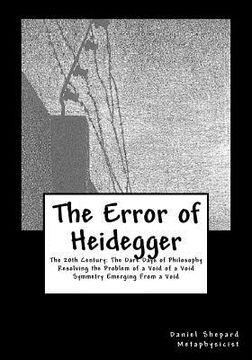Reseña del libro "the error of heidegger (en Inglés)"
The demise of metaphysics has become starkly apparent beginning with the nineteenth century and culminating in the twentieth centuries. The shambles of metaphysics is so apparent its absence was noted by one of the great cosmologists of the twentieth century when he stated: However, in the nineteenth and twentieth centuries, science became too technical and mathematical for the philosophers, or anyone else except a few specialists. Philosophers reduced the scope of their inquiries so much that Wittgenstein, the most famous philosopher of the century, said, "The sole remaining task for philosophy is the analysis of language." What a come down from the tradition of philosophy from Aristotle to Kant! Steven Hawking - A Brief History of Time But it is not the technicality of science, which has caused philosophy to draw up short of its objective and hesitate. As was expressed so well by Charles Seife in his book, Zero: The Biography of a Dangerous Idea, it was the fear of addressing the issue of 'nothingness', which caused philosophy and metaphysics to hesitate. Martin Heidegger accentuates this point in his lecture: The Fundamental Question of Metaphysics. In this lecture, Heidegger espouses what he claims is the fundamental question of metaphysics. Heidegger states the question: 'Why are there essents rather than nothing?' Having stated the question, Heidegger then expends thirteen thousand words to explain why the question is stated as such rather than being stated as: Why are there essents? Throughout the expenditure of his energies to understand why the first question as opposed to the second question, Heidegger makes such comments as: For why should we go on to ask about nothing? Nothing is simply nothing. He who speaks of nothing does not know what he is doing. ... He contradicts himself. ... to speak of nothing is illogical. He who speaks and thinks illogically is unscientific. But he who goes so far as to speak of nothing in the realm of philosophy, where logic has its very home, exposes himself most particularly to the accusation of offending against the fundamental rule of all thinking. Such a speaking about nothing consists entirely of meaningless propositions. Moreover he who takes the nothing seriously is allying himself with nothingness. He is patently promoting the spirit of negation and serving the cause of disintegration. Not only is speaking of nothing utterly repellent to thought: it also undermines all culture and all faith. What disregards the fundamental law of thought and also destroys faith and the will to build is pure nihilism. One must not conclude from this quote that it was Heidegger who lead us to the point of fearing 'nothingness' for Heidegger simply verbalized in an eloquent manner what it was humanity has always feared to confront and that is the concept of 'nothingness' itself... In short it will be stated that nothingness does exist. Even more disturbing it will be suggested that not only does nothingness exist but that nothingness has an active role to play in the dynamics of totality as opposed to the concept of nothingness having a potentially passive role to play in the dynamics of totality. So if the individual is individuality and God is the Whole, including what lies 'beyond' time, what is the universe? The universe 'is' the void. The universe 'is' nothingness itself. And so it is we are about to defy Heidegger's warning that to examine the concept of nothingness is to stamp one's own forehead with a letter more feared by philosophers than the scarlet letter 'A'. We are about to self impose a scarlet letter 'I' upon our brows. We are about to label ourselves as 'illogical'. Why risk being labeled 'illogical'? It is only by facing our fears that we can conquer our fears and until metaphysicians face their most dreaded fear, the fear of nothingness, we will not be able to move metaphysics to the its next level of development.

